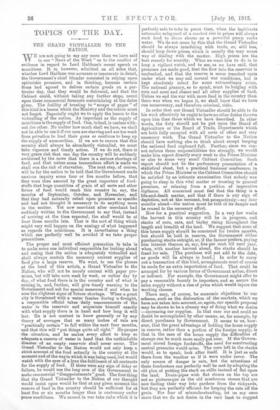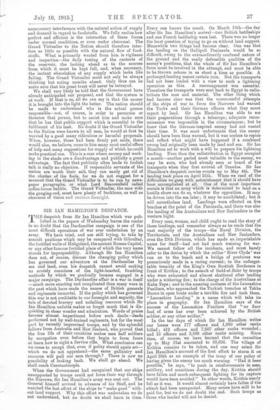TOPICS OF THE DAY,
THE GRAND VICTUALLER TO THE NATION. NVE are not going to say any more than we have said in our " News of the Week " as to the conflict of evidence in regard to Lord Haldane's recent speech on munitions. It is, however, admitted on all sides that, whether Lord Haldane was accurate or inaccurate in detail, the Government's chief blunder consisted in relying upon optimistic promises, and in thinking, because certain firms had agreed to deliver certain goods on a par- ticular day, that they would be delivered, and that the Oabiuet could, without taking any further steps, count upon these commercial forecasts materializing at the dates given. The futility of trusting to " scraps of paper " of this kind is a lesson which the Ministry and the nation must not forget. Especially ought we to apply the lesson to the victualling of the nation. As important as the supply of munitions is the supply of food. One, indeed, is useless with- out the other. No matter how much shell we have, we shall not be able to use it if our men are starving and are too weak from privation to load their guns or continue to keep up the supply of ammunition. If we are to ensure that this country shall always be abundantly victualled, we must take vigorous and timely action. If we do not, there is very grave risk that one day the country will be suddenly awakened by the news that there is a serious shortage of food, and that unless some tremendous effort is made we shall run the risk of starvation. The next step, of course, will be for the nation to be told that the Government made anxious inquiry some four or five months before, that they were then assured by the great importers of food- stuffs that huge quantities of grain of all aorta and other forms of food would reach this country in, say, the months of September, October, and November, and that they had naturally relied upon promises so specific and had not thought it necessary to do anything more in the matter. Yet now merchant after merchant had suddenly written to the Government to say that, instead of arriving at the time expected, the stuff would be at least three months late. That is the sort of thing which might very well happen on the analogy of what happened as regards the munitions. It is nevertheless a thing which can perfectly well be avoided if we take proper precautions.
The proper and most efficient precaution to take is to make some one individual responsible for looking ahead and seeing that the nation is adequately victualled and shall always contain the necessary current supplies of food plus a large reserve. We want, to use the phrase at the head of this article, a Grand Victualler to the Nation, who will not be merely content with paper pro- mises, but will take note week by week, or rather day by day, of what food there is in the country and of what is coming in, and, further, will give timely warning to the GoVernment and ask for special measures if and when he sees the slightest signs of future shortage. When a great city is threatened with a water famine during a drought, a responsible official takes daily measurements of the water in the reservoir and acquaints himself exactly with what supply there is in hand and how long it will last. He is not content to know generally or by any theory of averages that so many inches of rain are " practically certain " to fall within the next four months, and that this will " put things quite all right." He gauges the situation, and he makes every effort to keep so adequate a reserve of water in hand that the unthinkable disaster of an empty reservoir shall never occur. The Grand Victualler to the Nation would not only keep a strict account of the food actually in the country at the moment and of the way in which it was being used, but would watch with the eyes of a lynx the fulfilment of all contracts for the supply of food. If there were any sign of delay or failure, he would use the long arm of the Government to make commercial "disappointments" good. The first thing that the Grand Victualler to the Nation of our thought would insist upon would be that at any given moment the reserve of food in the country should be sufficient for at least five or six months longer than is customary under peace conditions. We cannot in war take risks which it is perfectly safe to take in peace time, when the legitimate automatic safeguard of a marked rise in prices will always suck food to these shores as a powerful pump sucks water. We do not mean by this that the Grand Victualler should be always interfering with trade, or, still less, should keep down prices, which is usually the very worst way of dealing with the matter. High prices are the best remedy for scarcity. What we want him to do is to keep a vigilant watch, and to see, as we have said, that promises are made good, that the flow into the reservoir is unchecked, and that the reserve is never trenched upon under what we may call normal war conditions, but is kept absolutely intact for some extraordinary crisis. The national granary, so to speak, must be bulging with corn and meat and cheese and all other supplies of food. Unless we end the war with more food in the country than there was when we began it, we shall know that we have run unnecessary, and therefore criminal, risks.
In order that our Grand Victualler should be able to do his work effectively he ought to have no other duties thrown upon him than those which we have described. In other words, the duty should not be put upon the Board of Agriculture or the Board of Trade, Departments which are both fully occupied with all sorts of other and very necessary work. The Grand Victualler to the Nation should have nothing else to think about except keeping the national food cupboard full. Further, since we can- not enforce these responsibilities too strongly, we would make him report directly every week to the Prime Minister or else to some very small Cabinet Committee. Such report should not be the perfunctory presentation of a. statistical sheet, but a practical business conference, in which the Prime Minister or the Cabinet Committee should be satisfied by an intimate examination that nobody was going to sleep in this vital matter or trusting to general promises, or relaxing from a position of imperative vigilance. All concerned must feel that the thing is a. life-and-death matter, and that if there is any sign of depletion, not at the moment, but prospectively—say four months ahead—the nation must be told of its danger and be roused to the necessary effort.
Now for a practical suggestion. In a very few weeks the harvest in this country will be in progress, and stacks of corn, oats, and barley rising throughout the length and breadth of the land. We suggest that none of this home supply should be consumed for twelve months, but should be held in reserve, the Government either purchasing stacks outright, or, if the farmer prefers, paying him interest thereon at, say, five per cent. till next year, when, with another harvest ahead, the stacks should be freed for sale. [The purchase will not add to the debt, as goods will be always in hand.] In order to carry out a transaction of this kind, arrangements must of course be made for an extra importation of food. That could be arranged for by various forms of Government action, direct or indirect. For example, the Government might offer to pay a reasonable bounty to importers, and so secure the extra supply without a rise of price which would injure the working classes. There may, of course, be economic objections to our scheme, such as the dislocation of the markets, which we have not taken into account, or, again, our specific proposal may be shown to be a clumsy way of doing what we desire —increasing our supplies. In that case our end could no doubt be accomplished by other means, as, for example, by direct purchases by Government. It seems to us, how- ever, that the great advantage of holding the home supply in reserve, rather than a portion of the foreign supply, is that in the case of the home supply the difficulties of storage can be much more easily got over. If the Govern- ment stored foreign foodstuffs, the need for constructing central granaries would arise. The corn left in the stacks would, so to speak, look after itself. It is just as safe there from the weather as if it were under cover. The only source of danger is rats, but the attentions of these freebooters can perfectly well be met by adopting the old plan of putting the stack on stilts instead of flat upon the land. Drain-pipes with flat stones on the top are not so picturesque as the old mushroom stones that are now finding their way into gardens from the rickyards, but they are perfectly efficient for keeping the rats off the grain. For fear of misunderstanding, let us say once more that we do not desire in the very least to suggest unnecessary interference with the natural action of supply and demand iu regard to foodstuffs. We fully realize how perfect and efficient is the interaction of these forcer under normal conditions, or even under abnormal. The Grand Victualler to the Nation should therefore inter- fere as little as possible with the natural flow of food- stuffs. What is primarily wanted from him is vigilance and inspection—the daily testing of the contents of the reservoir, the looking ahead as to the sources from which it must be kept full, and, when necessary, the instant stimulation of any supply which looks like failing. The Grand Victualler must not only be always thinking but acting months ahead. Only thus can he make sure that his great trust will never be betrayed. We shall very likely be told that the Government have already anticipated our proposal, and that the system is at work. If that is so, all we can say is that the sooner it is brought into the light the better. The nation should be made to understand who is the actual person responsible—not, of course, in order to persecute or threaten that person, but to assist him and make sure that he has that public support which is essential to the fulfilment of his task. No doubt if the Grand Victualler to the Nation were known to all men, he would at first be worried by a good many ridiculous or harmful proposals. When, however, these had been firmly put aside, there would also, we believe, come to him many most useful offers of help and many suggestions for supply of which he could make practical use. This is a case where secrecy and work- ing in the shade are a disadvantage and publicity a great advantage. The fact that publicity often leads to foolish talk is really no objection. If responsible servants of the nation are worth their salt, they can easily get rid of the chatter of the fools, for we do not suggest for a moment that the Grand Victualler is to be run by news- paper paragraphs, or what Lord Beaconsfield called coffee-house babble. The Grand Victualler, the man with the gauging-rod, must have plenty of backbone, as well as clearness of vision and anxious foresight.



































 Previous page
Previous page